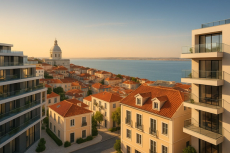Blog • Published on:May 29, 2025 | Updated on:May 29, 2025 • 19 Min
Portugal Property Investment and How to Buy a Home in 2025
In 2025, Portugal's real estate market continues to attract international attention, with property prices rising by 10.8% year-over-year, reaching a median of €1,819 per square meter in the third quarter of 2024. This growth is fuelled by factors such as foreign investment, a thriving tourism sector, and a limited housing supply.
However, this surge has led to affordability challenges for local residents, prompting government initiatives like permitting construction on rural land to increase housing availability. For investors, this dynamic presents both opportunities and complexities, making it crucial to understand regional trends, legal requirements, and financial considerations.
Overview of Buying Property in Portugal
Why Are Investors Still Eyeing Portugal in 2025?
Portugal remains a reliable magnet for global property buyers for three key reasons: stable economic performance, consistent capital appreciation in real estate, and one of the most buyer-friendly legal systems in the EU.
Despite a few regulatory changes in recent years, the fundamentals haven’t changed, real estate in Portugal continues to offer predictable returns, especially in urban and tourist-heavy areas.
The country’s real estate sector contributes significantly to GDP, driven by both domestic demand and a growing share of foreign investors. Even as remote work culture matures and digital nomadism becomes more structured, places like Lisbon, Cascais, and Lagos remain hotspots thanks to strong internet infrastructure, vibrant expat communities, and relatively low living costs by Western European standards.
What's the Investment Climate Like in 2025?
In 2025, Portugal’s property market is characterized by:
- Rising Demand in Secondary Cities: Braga, Aveiro, and Évora are gaining traction among mid-budget investors priced out of Lisbon and Porto. These cities offer lower entry points but comparable rental yields.
- Government Push for Rural Development: New policies allow residential construction on previously restricted rustic land. This could ease pressure on urban zones and open doors for early-mover investors in countryside regions.
- Rental Boom: Urban rental demand is surging due to tightening mortgage conditions and lifestyle shifts, which fuels opportunities for buy-to-let models, especially short-term rentals in tourist zones and long-term leases in university towns.
Key Benefits of Buying Property in Portugal
What Makes Portugal a Strategic Entry Point?
- Strategic location between Europe, Africa, and the Americas, with direct flights to major cities.
- Low transaction costs compared to France, Spain, or Germany.
- Resilient market: Portugal’s real estate showed strong post-COVID recovery, and didn’t overheat in the 2020–2023 global inflation wave, thanks to conservative lending practices.
Portugal’s Real Estate Market Analysis
What Are the Current Property Prices in Portugal?
As of Q1 2025, the average price per square meter in Portugal stands at approximately €1,960, reflecting a year-on-year increase of 8.7%. Prices vary widely depending on location:
Lisbon continues to dominate in price, but its growth has slowed slightly due to affordability limits. Meanwhile, secondary markets like Braga and Évora are heating up, especially among remote workers and early investors looking for higher appreciation potential.
What Are the Key Market Trends and Growth Indicators?
1. Shift Toward Interior and Coastal Towns
Investors are increasingly looking beyond Lisbon and Porto. Coastal towns like Nazaré and Sesimbra are seeing increased inquiries, and interior gems like Viseu are making headlines for offering double-digit rental yields on low-cost acquisitions.
2. Rental Demand Spike
With mortgage conditions tightening, more locals are turning to rentals. This is boosting rental yields, especially in university cities like Coimbra and expat havens like Lagos.
3. New Construction Permits Increasing
Although construction was slow to recover post-pandemic, 2024 saw a 14% increase in residential building permits, signalling more inventory in the pipeline and possibly moderating prices in some overheated zones.
4. Tourism Driving Short-Term Rentals
Despite regulatory pushbacks in Lisbon and Porto, the short-term rental market remains strong in places like the Algarve and Madeira, where tourism continues to outperform 2019 pre-pandemic levels.
Where Are Foreign Buyers Investing the Most?
Most buyers are looking for a mix of lifestyle utility and investment yield, with some using property as a stepping stone for residency or retirement in the EU.
Legal Requirements for Buying Portuguese Property
What Documents Do You Need to Buy Property in Portugal?
Foreigners can freely buy property in Portugal, but you'll need to gather a few essential documents before initiating the process:
A power of attorney (POA) can also be arranged for buyers who want to authorize a lawyer to act on their behalf throughout the process, ideal for non-residents who cannot travel frequently.
What’s the Property Purchase Process in Portugal?
Here’s a step-by-step overview of how the property purchase process typically works:
- Obtain NIF Number
Visit a local tax office or authorize your lawyer to obtain this for you.
- Open a Portuguese Bank Account
This is where purchase funds and taxes will be transferred from.
- Reserve the Property
A reservation agreement may be signed to secure the property while contracts are prepared.
- Sign the Promissory Contract (Contrato de Promessa de Compra e Venda)
You pay a deposit (usually 10–30%) at this stage. This contract legally binds both parties.
- Conduct Due Diligence
Your lawyer will verify the land registry, property title, zoning laws, and debts (if any).
- Sign the Final Deed (Escritura Pública de Compra e Venda)
This is signed before a notary, and you’ll pay the remaining balance. Ownership is officially transferred and registered.
- Register the Property
The transaction is recorded at the Land Registry (Registo Predial) and Tax Office.
What Is the Role of Legal Representatives?
Hiring a lawyer (advogado) is not mandatory by law, but it’s highly recommended. Here’s why:
Most foreign investors work with a Portuguese-speaking legal team or an English-speaking law firm specializing in real estate transactions.
Portuguese Golden Visa Through Real Estate
Is Real Estate Still Eligible for the Golden Visa in 2025?
As of 2025, residential real estate in high-density urban areas like Lisbon, Porto, and much of the Algarve is no longer eligible for the Golden Visa. This change came into effect in late 2023 as part of housing reform measures.
However, real estate in designated interior regions and islands such as Madeira and the Azores, as well as certain commercial properties, remains eligible.
Read more about the Golden Visa and how real estate investment can help you qualify in our blog: Portugal Golden Visa Program – What You Need to Know
What Are the Minimum Investment Requirements?
To qualify for a Golden Visa through real estate, the following thresholds apply:
Important: “Low-density” areas are defined by population and development criteria set by the Portuguese government. A qualified legal representative can validate whether a property fits the criteria.
What Property Types Qualify in 2025?
Eligible property types for Golden Visa include:
- Commercial units (hotels, shops, warehouses)
- Rural guesthouses and eco-tourism projects
- Renovated residential buildings in approved interior zones
- Multi-unit purchases as long as they collectively meet the minimum
Residential apartments in Lisbon, Cascais, or Porto no longer qualify unless they fall under specific exemptions (such as historical restoration in low-density zones).
How Does the Application Process Work?
Here’s how the Golden Visa application typically proceeds:
- Choose an Eligible Property
Ensure it fits government-mandated geographic and usage criteria.
- Reserve the Property and Sign a Promissory Contract
You must deposit the required amount in a Portuguese bank account.
- Complete the Purchase
Finalize the deed and get the property registered.
- Submit Online Application
Through SEF (Portuguese Immigration and Borders Service), with all required documentation.
- Biometrics Appointment
You’ll attend a biometric data collection session in Portugal.
- Approval and Residence Card Issuance
Once approved, your initial card is valid for 2 years (renewable for 3).
What Are the Benefits and Rights?
Costs of Buying Property in Portugal
What Are the Main Costs Involved When Buying Property?
Buying property in Portugal comes with several one-time transaction costs and ongoing obligations. These vary depending on the property’s value, location, and whether it's new or resale.
Let’s break this down further.
What Is the Property Transfer Tax (IMT) in Portugal?
The IMT (Imposto Municipal sobre Transmissões) is a progressive tax based on the property's price and purpose (primary residence or investment). It’s calculated as:
- Up to €92,407: 1%
- €92,407 to €126,403: 2%
- €126,403 to €172,348: 5%
- €172,348 to €287,213: 7%
- Above €287,213: 8%
For luxury properties (over €1 million), a flat rate of 7.5% applies.
For rural land or commercial property, a flat 6.5% IMT is usually charged.
Tip: IMT is paid before the deed is signed. Your lawyer or notary usually handles this on your behalf.
What Is Stamp Duty and When Is It Paid?
Stamp duty (Imposto do Selo) is 0.8% of the declared property value. It applies to all transactions, regardless of whether the buyer is a resident or not.
There may also be additional stamp duty if you’re taking out a mortgage loan, typically
0.6% on the loan amount.
What Are the Notary and Registration Fees?
These are mandatory administrative costs tied to the official transfer of ownership:
- Notary Fees: €500–€1,200
- Registration Fees: €250–€800
- Land Registry Certificate: €20–€30
- Deed preparation: €200–€500
Most of these can be bundled if using a lawyer or full-service conveyancer.
Ongoing Costs After Purchase
Best Areas to Buy Property in Portugal
1. Lisbon Metropolitan Area
Lisbon remains Portugal’s financial and tech capital. While prime areas are expensive, nearby commuter towns offer better value and rental yields. Cascais offers a strong international school network, making it popular among families relocating from the U.S., France, and Brazil.
Market Note: Properties in Lisbon’s historic districts are still in high demand for long-term rentals, especially from corporate tenants and embassy staff.
2. Porto and Northern Portugal
Porto offers a lower entry price compared to Lisbon with an equally vibrant cultural scene and strong tourism market. Vila Nova de Gaia, just across the Douro River, is seeing fast infrastructure upgrades and is considered a “buy now” opportunity.
3. Algarve Region
The Algarve continues to thrive due to year-round sunshine, an English-speaking community, and well-developed tourist infrastructure. Lagos in particular has become a hotspot for Americans and Canadians seeking a coastal base with rental income potential.
4. Madeira Island
Madeira is becoming a strategic Golden Visa location, especially as it retains eligibility under Portugal’s updated rules. It appeals to buyers seeking tax incentives, a mild climate, and relatively untapped development opportunities in the eco-luxury segment.
Investor Insight: Properties in Madeira can be more profitable during winter months due to the island’s subtropical climate and rising off-season tourism.
Types of Properties Available in Portugal
Residential Properties
Residential real estate remains the dominant choice for international buyers, particularly those focused on lifestyle upgrades, long-term stays, or stable rental income.
- Apartments
Mainly in urban hubs like Lisbon, Porto, and Coimbra, apartments offer strong rental potential due to high demand from students, expats, and corporate tenants. Studio and 1-bedroom units in city centers are especially popular for short-term rentals.
- Villas and Townhouses
Typically located in suburban and coastal areas such as Cascais, Estoril, and the Algarve. They appeal to families, retirees, and digital nomads seeking outdoor space, privacy, and proximity to international schools or the beach.
- Traditional Farmhouses and Rural Cottages
Located in scenic regions like Alentejo, Douro Valley, and northern Portugal, these properties are often used as countryside retreats, guesthouses, or wine tourism investments. They usually require renovation but come with larger land plots and lower acquisition costs.
- Renovation Projects (30+ years old)
Qualify for the reduced Golden Visa threshold of €350,000, or even €280,000 in designated low-density areas. Investors typically renovate them for resale or holiday rentals, often benefiting from tax incentives tied to rehabilitation.
Investor Insight: In smaller towns, demand for high-quality rentals is rising due to improved infrastructure and remote work trends, making well-renovated homes a lucrative niche.
Discover what it’s really like to live in Portugal, from cost of living to lifestyle tips, in our full guide: Living in Portugal: An Expat Guide
Commercial Real Estate
While less publicized, commercial property is increasingly seen as a strategic move, especially since Golden Visa rules now exclude most residential real estate in Lisbon and Porto.
- Office Spaces and Coworking Hubs
Lisbon and Porto’s startup ecosystems are fueling demand for flexible workspaces. Commercial leases here tend to be long-term and more stable than residential ones. Investors can purchase entire office floors or shared buildings in tech corridors or business districts.
- Retail Units (Street-Level Shops, Cafés, Boutiques)
In cities with high tourist traffic like Coimbra, Lagos, and Funchal, retail units offer solid returns, particularly in walkable historic centers. Some investors lease them to restaurant franchises or small chains on multi-year contracts.
- Hospitality Assets (Hotels, Boutique Guesthouses, Hostels)
Portugal’s tourism sector continues to outperform pre-pandemic figures. Investing in small hotels or local guesthouses, especially in the Algarve, Douro, and Madeira, offers strong seasonal returns and is still Golden Visa eligible in qualifying areas.
- Warehousing & Industrial Units
With Portugal’s growing role in EU logistics (especially near Sines Port and the Spanish border), industrial properties are seeing increasing demand. These are suited for investors with longer horizons and local management capability.
Land and Development Opportunities
Buying land in Portugal opens up long-term potential but also comes with strict zoning laws and bureaucracy, especially in protected rural areas.
- Urban Plots with Approved Licenses
Ideal for developers looking to build residential or mixed-use projects. These are most accessible in Lisbon’s outskirts, Setúbal, Braga, and medium-sized cities where housing demand is rising.
- Rustic or Agricultural Land
New regulations in 2025 allow residential construction on some rural plots under certain conditions, a significant shift aiming to reduce pressure on urban markets. These are most common in Alentejo, Central Portugal, and the interior north.
- Scenic or Coastal Land
While highly attractive, these areas are tightly regulated to prevent overdevelopment. Before buying, investors must consult local councils and verify construction viability through a qualified legal team.
Planning Tip: If your plan includes building from scratch, factor in 12–24 months for approvals, licensing, and construction, especially in protected heritage or coastal zones.
Financing Your Portuguese Property
Can Foreigners Get a Mortgage in Portugal?
Yes, non-residents can secure mortgages from Portuguese banks. In fact, many foreign buyers opt to finance part of their property purchase locally, especially when interest rates are competitive and capital preservation is a priority.
Most banks will finance up to 70% of the property’s value for non-residents. Residents (or those planning to relocate) can often access up to 90% financing, depending on income and creditworthiness.
What Do Banks Typically Require?
To apply for a mortgage in Portugal, you’ll need to provide a clear picture of your financial situation. Expect to submit:
- Valid ID or Passport
- Portuguese NIF (Tax Number)
- Proof of Income (e.g., payslips, contracts, tax returns)
- Bank Statements (last 3–6 months)
- Proof of Assets & Liabilities
- Property Details (preliminary contract, valuation, location info)
Banks assess debt-to-income ratio, aiming for no more than 35%–40% of your monthly income going toward total debt repayment (including the new mortgage).
Tip: Most banks require that you open a local account with them before issuing a mortgage.
What Are the Interest Rates and Terms in 2025?
As of early 2025, mortgage interest rates in Portugal range from 3.1% to 4.8%, depending on the loan type and borrower profile:
- Variable-Rate Mortgages
Pegged to the Euribor, with rates starting from 3.1%
Offer flexibility but may rise with EU base rate changes
- Fixed-Rate Mortgages
Typically 4.2%–4.8% for non-residents
Offer payment predictability for 5–30-year terms
- Mixed Options
Some lenders offer hybrid plans with fixed rates in early years followed by variable rates
Loan terms typically range from 5 to 30 years, with a preference for shorter terms for older buyers (age cap is usually around 70–75 at final repayment).
Are There Alternative Financing Options?
While bank mortgages are the most common, a few other paths exist:
- Developer Financing: In some new-build projects, developers offer payment plans or in-house financing (usually for shorter terms and higher deposits).
- Home Equity Loans (Abroad): Some buyers finance Portuguese property using equity from homes in their home country.
- Private Lending: Available, but often with higher interest rates and less buyer protection, use with caution and strong legal oversight.
Be cautious: Mortgage approval can take 4–8 weeks, and offers are time-limited. Always align property negotiations with financing deadlines to avoid penalties or lost deposits.
Property Management and Rental Income
How Does the Rental Market in Portugal Look in 2025?
Portugal’s rental market is thriving in 2025, driven by two main factors: growing expat demand and tighter mortgage conditions for local buyers. With more people choosing to rent rather than buy, especially in urban and university-heavy areas, landlords are seeing rising occupancy rates and solid rental yields.
Short-term rentals (like Airbnb-style listings) are still strong in tourist zones, though regulated, while long-term rentals have surged in popularity in Lisbon, Porto, Braga, and Coimbra due to a growing digital nomad presence and local student populations.
Example: A one-bedroom apartment in central Lisbon can earn €1,200–€1,500/month in long-term rent, or €80–€120/night as a short-term rental, depending on the season and furnishing.
What Types of Property Management Services Are Available?
Whether you're living in Portugal or abroad, hiring a property management company is highly recommended, especially if you're operating short-term lets or don't speak Portuguese.
Typical services include:
- Tenant sourcing and screening
Handling advertising, lease agreements, and background checks
- Maintenance coordination
Regular upkeep, emergency repairs, and renovation oversight
- Rent collection and financial reporting
Monthly summaries, tax documents, and bank transfers to your account
- Check-in/out logistics for short-term stays
Includes key handover, cleaning coordination, and guest communication
Most full-service agencies charge:
- 8%–12% of monthly rent for long-term rental management
- 20%–30% of revenue for short-term/vacation rentals
Tip: Some firms offer multilingual support and bundle tax representation, which is a bonus if you’re managing multiple properties remotely.
What Are the Tax Implications for Rental Income?
All rental income in Portugal is taxable, whether you're a resident or not.
For Non-Residents:
- Taxed at a flat rate of 28% on net rental income (after allowable deductions)
- Deductions include maintenance costs, management fees, municipal taxes, and insurance
- You must file an annual Portuguese tax return, even if you live abroad
For Residents:
- Rental income is added to global income and taxed progressively
- If you qualify under the Non-Habitual Resident (NHR) regime, foreign-sourced rental income may be exempt or taxed at favourable rates, depending on tax treaties
Learn how to reduce your tax burden legally with Portugal’s NHR program in our blog: NHR Tax Regime in Portugal – Benefits and Requirements
Pro tip: Always consult a Portuguese tax advisor to ensure you’re deducting all eligible expenses and complying with municipal short-term rental license rules (Alojamento Local or "AL" registration).
Step-by-Step Guide to Property Purchase
Whether you're buying a vacation home, rental investment, or applying for a Golden Visa, the purchase process in Portugal follows a well-defined path. Here’s how to move from search to ownership without surprises.
Step 1: Initial Property Search
Start by identifying your goals: lifestyle, investment, Golden Visa, or a combination. Then narrow down the location, budget, and property type.
- Use reliable local agents and portals like Idealista, Imovirtual, and Casa Sapo.
- Schedule in-person or virtual viewings, many agencies now offer 3D tours.
- Consider using a buyers’ agent, especially if you want unbiased guidance or are buying remotely.
Tip: Properties in Portugal often sell quickly if priced right, act fast if something matches your checklist.
Step 2: Making an Offer
Once you’ve chosen a property:
- Submit a formal Letter of Intent (LOI) or direct offer through your agent.
- If accepted, the seller may take the property off the market for a short reservation period.
- You may be asked to pay a reservation deposit (usually €5,000–€10,000), refundable only under agreed conditions.
Important: Ensure all terms are reviewed by your lawyer before transferring any funds.
Step 3: Sign the Promissory Contract (Contrato de Promessa de Compra e Venda)
This is the legally binding agreement between buyer and seller. Key elements include:
- Price, payment structure, and penalties for non-compliance
- Property description, legal status, and handover date
- Deposit (usually 10%–30% of the property price)
At this point, due diligence begins, your lawyer will check title deeds, legal registrations, zoning approvals, and confirm no liens or debts are attached to the property.
Step 4: Closing the Deal – Escritura Pública
The final deed is signed in front of a notary and witnessed by legal representatives. You’ll need to:
- Pay all remaining funds (usually via certified bank cheque)
- Settle taxes and fees (IMT, stamp duty, registration)
- Finalize utility transfers and obtain property keys
The notary registers the deed with the Land Registry (Registo Predial) and Tax Office (Autoridade Tributária). Ownership is now legally yours.
Step 5: Post-Purchase Requirements
After closing, don’t forget to:
- Change utility contracts (electricity, water, gas, internet)
- Register with the local municipal authority for IMI tax (property tax)
- Set up property insurance
- If rented, register for AL license (short-term) or notify tax office (long-term)
Optional but smart: Hire a local accountant or fiscal representative, especially if you’re non-resident, they’ll help with annual reporting, tax optimization, and compliance.
Building Your Future in Portugal, One Investment at a Time
Portugal isn’t just a place to buy property, it’s where many investors are building an entirely new chapter of life. Whether you're drawn by the country’s mild climate, thriving expat communities, or the growing appeal of second residency in the EU, real estate remains one of the most strategic ways to secure your place in the country’s future.
In 2025, we’re seeing a shift toward purpose-driven investment, where buyers aren’t just chasing returns, but seeking resilience, residency, and real-world utility. From modern apartments in Porto to hillside villas in Madeira, Portugal offers something uniquely flexible for every profile, digital nomads, retirees, entrepreneurs, and global families alike.
If you're considering investing in Portuguese property to gain residency, access Europe, or secure a foothold in a stable and welcoming market, Savory & Partners can help you navigate the legal, financial, and logistical landscape with confidence.
Reach out today to explore how your next property purchase can open doors, not just to Portugal, but to an entire continent.
FAQs on Buying Property in Portugal for Residency and Investment
1. Can foreigners buy property in Portugal without being residents?
Yes, Portugal places no restrictions on foreign property ownership. Whether you're an EU or non-EU national, you can purchase residential or commercial real estate without needing a local residence permit. However, a Portuguese NIF (tax identification number) and a local bank account are mandatory to complete the transaction.
2. Is buying property still a valid way to apply for Portugal’s Golden Visa in 2025?
Yes, but with limitations. As of 2024, only commercial properties and residential real estate located in designated low-density interior areas or islands (Madeira, Azores) qualify for the Golden Visa. Popular cities like Lisbon, Porto, and much of the Algarve are excluded from eligibility.
3. How much do I need to invest to qualify for a Golden Visa through property?
The minimum investment threshold is €500,000 for most eligible properties. This drops to €350,000 if the property is more than 30 years old or in an urban rehabilitation zone, and further to €280,000 in low-density municipalities. These properties must still meet zoning and registration criteria.
4. What are the annual taxes I must pay after buying a property in Portugal?
You will be required to pay IMI (Imposto Municipal sobre Imóveis), the annual municipal property tax. Rates typically range between 0.3% and 0.8% of the property’s tax value (not market value), depending on the municipality and whether the property is urban or rural.
5. Can I rent out my property while holding a residency or Golden Visa?
Yes, there are no restrictions on renting out your property, whether long-term or short-term. However, for short-term rentals (under 30 days), you must apply for an Alojamento Local (AL) license, which may not be available in some urban areas due to local housing laws.
References
Assembleia da República. (2024). Lei n.º 56/2023 – Regime Jurídico de Entrada, Permanência, Saída e Afastamento de Estrangeiros do Território Nacional. Retrieved from https://dre.pt/dre/detalhe/lei/56-2023-213909528
Serviço de Estrangeiros e Fronteiras (SEF). (2025). Autorização de Residência para Atividade de Investimento (ARI). Retrieved from https://www.sef.pt/pt/pages/conteudo-detalhe.aspx?nID=40
Autoridade Tributária e Aduaneira (AT). (2025). Imposto Municipal sobre Imóveis (IMI). Retrieved from https://www.portaldasfinancas.gov.pt/pt/informacaoContribuintes/imi
Instituto Nacional de Estatística (INE). (2025). Estatísticas de Preços da Habitação ao Nível Local – 1º Trimestre 2025. Retrieved from https://www.ine.pt/xportal/xmain?xpid=INE&xpgid=ine_publicacoes
Câmara Municipal de Lisboa. (2024). Regras do Alojamento Local. Retrieved from https://www.cm-lisboa.pt/viver/habitacao/alojamento-local
Written By

João Silva
João Silva is a seasoned consultant in the global mobility industry with over 12 years of experience. Specializing in European residency and citizenship by investment programs, João has assisted hundreds of high-net-worth clients in securing their second citizenship through strategic investments in real estate and government bonds.
Related Articles








Recently Published









Book a free consultation


